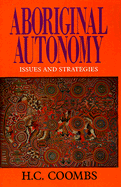Book contents
- Frontmatter
- Contents
- Foreword by Michael Dodson
- Preface
- Acknowledgments
- The Aboriginal World View
- Aborigines and the Land
- Aboriginal Lifestyles
- 5 Economic, social and spiritual factors in Aboriginal health
- 6 Aboriginal education and the issues underlying Aboriginal deaths in custody
- 7 Aboriginal work and economy
- Aborigines, Resources and Development
- Aborigines, Law and the State
- Asserting Autonomy: Recent Aboriginal Initiatives
- The Recognition of Native Title
- Conclusion
- Appendix: The Eva Valley Statement
- References
- Select Bibliography of work by H.C. Coombs
- Index
7 - Aboriginal work and economy
Published online by Cambridge University Press: 03 May 2011
- Frontmatter
- Contents
- Foreword by Michael Dodson
- Preface
- Acknowledgments
- The Aboriginal World View
- Aborigines and the Land
- Aboriginal Lifestyles
- 5 Economic, social and spiritual factors in Aboriginal health
- 6 Aboriginal education and the issues underlying Aboriginal deaths in custody
- 7 Aboriginal work and economy
- Aborigines, Resources and Development
- Aborigines, Law and the State
- Asserting Autonomy: Recent Aboriginal Initiatives
- The Recognition of Native Title
- Conclusion
- Appendix: The Eva Valley Statement
- References
- Select Bibliography of work by H.C. Coombs
- Index
Summary
Paper presented to Commissioner P Dodson, Underlying Issues Unit of the Royal Commission into Aboriginal Deaths in Custody, 1990.
There is an assumption continuously propagated by white Australian authorities to Aboriginal people that there are ‘jobs’ available and that those jobs alone can offer the rewards of the lifestyle Aborigines seek. It is an assumption certainly not proven and its reiteration by whites is designed to persuade Aborigines to accept assimilation into the Australian and international economic systems. It also ignores the probable consequences of such assimilation which often carries with it the social and personal relationships that those systems establish between employer and employee and which, at least tacitly, demand patterns of behaviour and values appropriate to their relative status within it.
There is substantial evidence (Altman 1987; Coombs et al. 1989) that Aborigines often make substantial sacrifices to avoid accepting these relationships and their implications. What can be said is that Aborigines, like other people, want to be purposefully occupied, that they seek and welcome contexts and opportunities which enable them to demonstrate their energy, skills and judgement, and thereby to acquire status among their peers. Anyone who doubts the capacity of Aborigines to work skilfully, purposefully and sustainably should read Raparapa, Paul Marshall's (1988) account of the working live of Fitzroy River Aboriginal drovers, or Anne McGrath's (1987) description of the work undertaken by Aboriginal stockmen and women in the Northem Territory.
- Type
- Chapter
- Information
- Aboriginal AutonomyIssues and Strategies, pp. 76 - 84Publisher: Cambridge University PressPrint publication year: 1994



